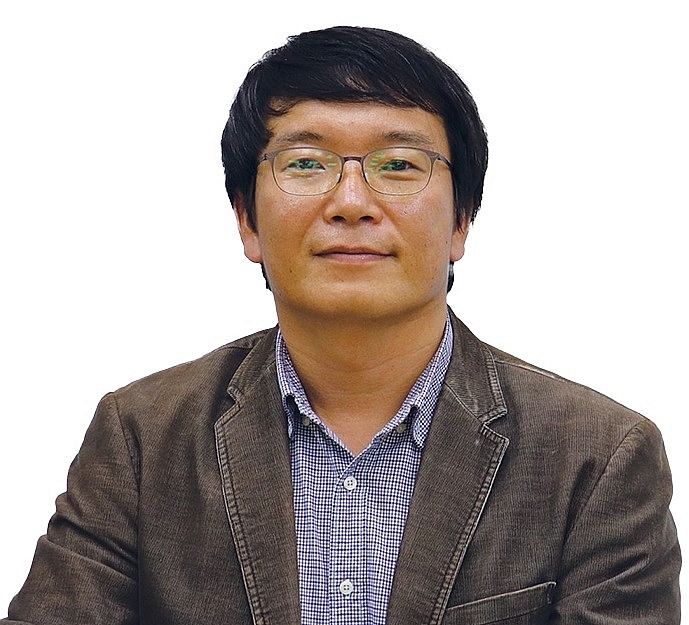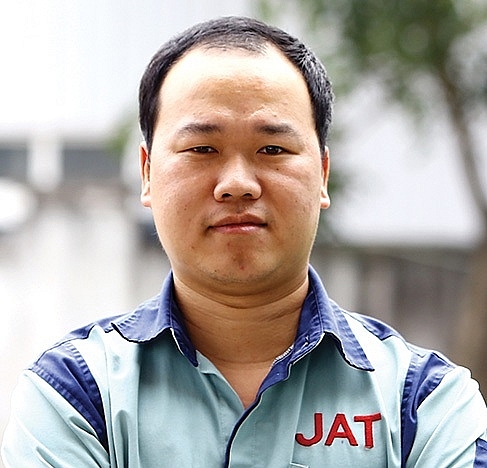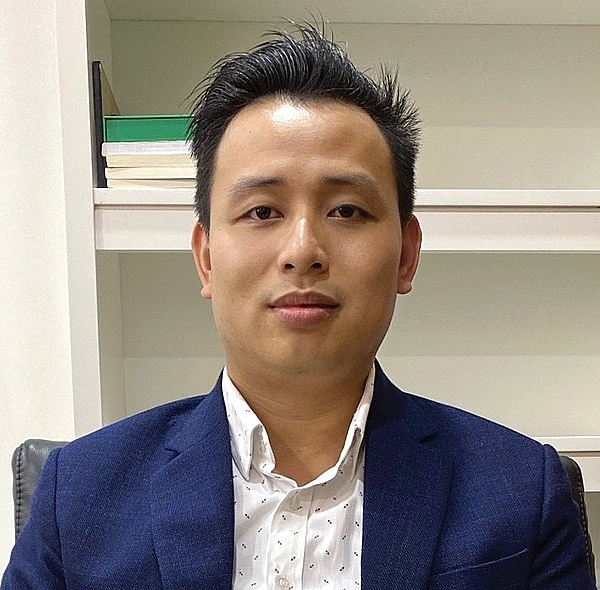Solving issues with VITASK support
It has been reported that Vietnam is some way off achieving some mid- to long-term manufacturing targets. How do you evaluate domestic enterprise capacity in this regard?
 |
| Kyoung-Jin An, deputy director of the Vietnam Technology Advice and Solutions from Korea Centre (VITASK) |
The Vietnamese supporting industries have many opportunities to develop as several large foreign groups such as Samsung, Hyundai, and LG plan to increase localisation rates in Vietnam. However, few Vietnamese enterprises can become their first-tier vendors, with almost all Vietnamese enterprises manufacture exclusively in packaging and simple spare parts.
In terms of car assembly and manufacturing, for example, a Ministry of Industry and Trade (MoIT) report last year showed that the localisation rate of this industry was only 7-10 per cent in 2019, which is much lower than the target of 45 per cent by 2025. In addition, the local automobile industry has not been able to invest in core and high-tech products such as engine production and transmission systems.
Meanwhile, the Vietnamese government is making efforts to enhance the development of the supporting industry and the latest move is the issuance of Resolution 115. The industry is expected to develop through the mobilisation of resources of all economic sectors, especially foreign-invested enterprises (FIEs) and domestic counterparts.
Besides that, the governments of South Korea and Vietnam plan to continue working together in order to support investment and trade activities for enterprises on both sides. In December 2020, the two governments signed a business agreement with representatives of the South Korean Ministry of Trade, Industry, and Energy, the MoIT, LG Electronics, Hyundai Motors, and POSCO in attendance.
The agreement is to provide technical consulting for Vietnamese material, component, and equipment suppliers and build closer ties in terms of mutual supply and demand.
Based on this, VITASK was established with the goal to help domestic enterprises improve their competition capacity to participate in the global value chains. Only then can local enterprises build up the foundation for sustainable development.
The centre is expected to promote a technical assistance programme with South Korean consultants to help Vietnamese businesses solve technical problems at the production site, engineer training courses for students, supporting product performance assessment, error analysis, promoting technical exchanges between Vietnamese and South Korean businesses.
Its purpose is to further promote bilateral cooperation in the field of industrial materials, equipment, and components and for South Korean companies to join Vietnam’s national projects.
What are the criteria to select the enterprises receiving VITASK support?
VITASK is an international cooperative official development assistance project run by the Vietnamese and South Korean ministries, thus enterprises will not have to pay a fee.
However, the financial fund of the project is limited, thus, in order to ensure the highest effectiveness we will implement the programme in the north only. The enterprises only need to submit dossiers and wait for our appraisal.
Regarding the criteria, we will select enterprises based on their business realities, the capacity to receive technical support, and the determination of leadership teams in reforming their operations. The latter is essential because it takes a long time to see the benefits of this technical support and it also takes consecutive improvements, which requires their patience.
The project’s targeted objects are small- and medium-sized enterprises and we will focus on areas that involve many skilled engineers.
We received around 40 dossiers thus far. We are implementing project appraisal and will visit manufacturing facilities in February. In March, the list of eligible candidates will be determined and we will start to implement the supporting programme.
The project is to be implemented over five years to support 60 enterprises. Each year, we will select 12 candidates, including six in the automotive sector and six in the electric-electronic industry, to receive technical support.
Could the project eventually expand to support more than 60 companies?
Sixty is not a small number compared to the project’s scale because it is a deep and thorough supporting programme, which will help enterprises deal with their internal problems, including lowering the amount of defective products and increasing production capacity on existing manufacturing lines.
I know that numerous domestic enterprises invested much money in modern machinery but these facilities’ production capacity is not as high as the design, and they still cannot become first-tier vendors for large-scale groups due to failure to meet strict requirements in terms of quality.
We will study the demand and manufacturing capacity of each business and then design particular supporting schemes for them. VITASK’s experts will accompany enterprises on average for 2-3 years with several supporting phases each year.
In some cases, VITASK will even work with enterprises for up to five years. Along with the intensive supporting programme, VITASK is willing to advise and consult enterprises with general problems.
How do the training programmes for university engineers and technical consultant experts work?
The centre will train engineers and professional technical consultants while running material and component performance assessment programmes for Vietnamese companies. The training project is implemented at Hanoi University of Industry with the support of experts coming from Korea Polytechnic University.
Hanoi University of Industry has a lot of international cooperation experience, including cooperation programmes with companies, groups, colleges, and universities from South Korea, thus it is the right selection for VITASK.
After finishing the training courses and earning certificates, students and experts will be confident in what they have learned from large-scale groups as well as enterprises listed in VITASK’s supporting project thanks to solid specialist knowledge. Besides that, VITASK will be a bridge to connect supply with demand from the South Korean side.
There are, of course, major South Korean groups in Vietnam such as Samsung, LG, and Hyundai. How does VITASK mobilise these powerful sources in its supporting project?
Numerous South Korean groups, for example Samsung, plan to increase the localisation ratio. This group will expand the programme to high-tech industries, helping local firms to produce sophisticated electronic parts and be part of Samsung’s global supply chain for high-tech products.
In addition, local carmaker Truong Hai Auto Corporation has been producing and distributing South Korean brand names like Kia. In order to prolong these cases, the centre and the groups will cooperate with each other to determine items that they want to localise and then look for vendors to support them to increase the production capacity.
After parties reach a compromise on models, selling prices, and the quality of products, VITASK will start to implement the supporting programme so that domestic manufacturers can meet their partners’ requirements.
However, increasing the localisation rate is still a big challenge, especially for automobile makers in Vietnam as the country has a modest car market and poor supporting industries. Thus, domestic manufacturers need to improve their know-how in technology and mass production to offer competitive prices at home and abroad.
It will be difficult to become a first-tier vendor in a short time, however, opportunities will come with technical improvements.
How will effectiveness of the programme eventually be measured?
The largest target of VITASK is to create a solid and sustainable ecosystem to help domestic manufacturers penetrate into the global supply chain in terms of the automotive and electric-electronic industries.
It is difficult to measure the capacity to establish the industrial ecosystem or sustainable development via specific figures, thus, after finishing the programme, the centre will survey to collect the opinion of enterprises, as well as indirectly measure via calculating the number of domestic vendors for global groups.
We believe in the programme’s success because there are precedents about similar supporting models, including support from Samsung. The group created opportunities for six enterprises to showcase their performance after finishing a three-month process with Samsung experts. The consultancy with South Korean experts helped enterprises improve their production process and meet the criteria for supplying products and components to Samsung factories, with products’ error ratio decreasing by an average of 25 per cent and production capacity increasing by 30 per cent.
| Dang Dinh Thinh - Senior engineer, JAT Autoparts and Industrial Equipment Production JSC
The company has undertaken two supporting programmes, a three-month Samsung productivity enhancement and a six-month World Bank engineer training opportunity. These programmes created stepping stones for businesses to more quickly reach product quality standards in the global supply chain. After being assisted by Samsung experts in applying new production solutions, JAT overcame 73 technical errors in production, improved 15 per cent of manufacturing productivity, and increased warehouse area utility. During the training scheme, we had opportunities to work directly with experts from South Korea at the workshops and they issued average training density, thus, we had enough time to acquire knowledge and put it into practice. The World Bank project, running currently, is focused on improving the capacity of the engineering team. It is only a pity that we have had to learn online because of the COVID-19 pandemic. These examples show the importance of supporting programmes from international groups and organisations. The VITASK course could be useful for supporting enterprises in general and JAT in particular. Tran Thi Thu Trang - CEO, Hanel Production and Import-Export JSC
We always aim to be the leading Vietnamese enterprise in processing and providing electric-electronic components. In order to realise this target, studying is important. Over 15 years of working with international partners have given us precious experience, prestige, and high precision for even the smallest things. One of the courses that personally impressed me with its effectiveness is Keieijuku – a Japanese-style business management programme which covers a wide range of aspects, from business philosophy and personnel to business strategy and production management. The 10-month course focuses on providing participants with the opportunity to learn and acquire practical knowledge and tools for business administration. Learners can also create links with Japanese enterprises during and after their time in Japan. The knowledge they got from the programme helped enterprises renovate and improve their business and production efficiency, gradually reaching Japanese standards. The VITASK scheme is a useful programme for domestic enterprises. Because they will have opportunities to work with experts from South Korea, they will understand these companies’ work style as well as their requirements and then adapt. Nguyen Xuan Tan - CEO, Smart Tech Vina Co., Ltd.
Smart Tech Vina was honoured to be one of the companies participating in Samsung’s productivity enhancements. After the three-month course, we reported numerous enhancements in terms of productivity and product quality, and created a better working environment for employees. From practical experience, methodical training is extremely important and brings much higher efficiency compared to going into reform on the company’s own back. Some years ago, the leadership team bought some curricula themselves to study and apply to the company, however, the efficiency was low because these curricula offer general theories, and the specific examples did not match our specific situation. Moreover, we had to evaluate the results ourselves, which makes it very subjective. Meanwhile, at Samsung’s supporting programme, we had the opportunity to work directly with experts, thus any problems that arise are resolved quickly. It is easy to see that the domestic supporting industry is young and the leadership teams are often young too, thus capacity and experience is limited. South Korea’s development history of the supporting industry is long and Samsung in particular has 50-60 years of experience in this sector. Thus, they can immediately see the mistakes and unreasonable inefficiencies in the manufacturing process. This advantage will contribute to helping domestic enterprises shorten the migration roadmap. The representative of the Ministry of Industry and Trade contacted the company to introduce the VITASK project.Our taskforce has enhanced its manufacturing operation based on initial guides and achievements of the Samsung programme, so we will consider joining the course in the next few years. Currently, Smart Tech Vina is a partner of Samsung and over 30 satellite vendors. The company targets to become vendors for LG, Luxshare, and domestic groups including Viettel, among others. |
What the stars mean:
★ Poor ★ ★ Promising ★★★ Good ★★★★ Very good ★★★★★ Exceptional
 Tag:
Tag:
Related Contents
Latest News
More News
- VinaCapital launches Vietnam's first two strategic-beta ETFs (February 26, 2026 | 09:00)
- PM sets five key tasks to accelerate sci-tech development (February 26, 2026 | 08:00)
- PM outlines new tasks for healthcare sector (February 25, 2026 | 16:00)
- Citi report finds global trade transformed by tariffs and AI (February 25, 2026 | 10:49)
- Vietnam sets ambitious dairy growth targets (February 24, 2026 | 18:00)
- Vietnam, New Zealand seek level-up in ties (February 19, 2026 | 18:06)
- Untapped potential in relations with Indonesia (February 19, 2026 | 17:56)
- German strengths match Vietnamese aspirations (February 19, 2026 | 17:40)
- Vietnam’s pivotal year for advancing sustainability (February 19, 2026 | 08:44)
- Strengthening the core role of industry and trade (February 19, 2026 | 08:35)

























 Mobile Version
Mobile Version